DeepJournal interviews an expatriate who did what Willem Middelkoop is advising
Piet van Dongen is a Dutchman in Brazil. A year and a half ago he decided to leave The Netherlands behind him. In the DeepJournal interview series with financial reporter Willem Middelkoop, he recognized the same rationale that he had for doing this. In that series, Middelkoop describes the hidden weakness of the current economic environment, and points out some of the options available to those individuals who would like to limit the damage caused by a potential crash of our social system. Van Dongen came to the same conclusions several years ago, and took the necessary measures to seek out a safe haven elsewhere. After a year and a half of research he found it under the palm trees of Brazil.
DeepJournal spoke with Van Dongen during a short visit to The Netherlands on June 7th of this year. Download the interview [Dutch spoken, MP3, 14 Mb].
By Daan de Wit
Piet van Dongen: 'We live in Brazil about seven kilometers from the sea, so we've got fish, there's agriculture, and there's cattle farmed here. We grow some Dutch vegetables ourselves, because we do still like to have those. We have our own well water, and we have 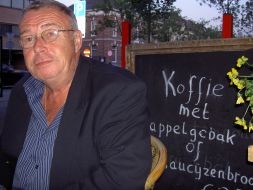 a windmill that can pump the water if there is enough wind. We have electricity, so we're only dependent on a few variables. The climate is exceptionally nice - it stays between 80 and 92 degrees F throughout the entire year. We get a rainy season that lasts approximately three months, during which time we collect water, which we need for the duration of the year.'
a windmill that can pump the water if there is enough wind. We have electricity, so we're only dependent on a few variables. The climate is exceptionally nice - it stays between 80 and 92 degrees F throughout the entire year. We get a rainy season that lasts approximately three months, during which time we collect water, which we need for the duration of the year.'
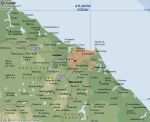 Preemptive expatriate Piet van Dongen is 58 years old and knows a little something about taking initiative. As a child he would spend his free time on his parents farm, and not long after that he decided to become a butcher: 'I was a butcher up until 1985. After that I started up a business as a self-employed computer programmer and system administrator, and did that until 1992.' It was around that time that Van Dongen came to the realization that 'big problems might be in store' for Western society. After cutting down on his work activities, he started to reconsider his future.
Preemptive expatriate Piet van Dongen is 58 years old and knows a little something about taking initiative. As a child he would spend his free time on his parents farm, and not long after that he decided to become a butcher: 'I was a butcher up until 1985. After that I started up a business as a self-employed computer programmer and system administrator, and did that until 1992.' It was around that time that Van Dongen came to the realization that 'big problems might be in store' for Western society. After cutting down on his work activities, he started to reconsider his future.
Piet van Dongen: 'I have a very positive attitude about life, just like Willem Middelkoop, and I look on the bright side of things. I've never had any problems that have caused me to lay awake at night, not even for an hour. I don't mean to be negative, but we're just not going to be able to sustain our way of life living the way we do. I think that what Middelkoop says about self-sufficiency is the most important thing he talks about. See to it that you have enough supplies on hand, make sure you always have some cash in the house, and surround yourself with people who can help each other. I think that's the best thing you can do.'
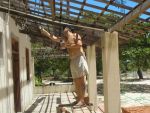 Van Dongen has traveled regularly throughout Europe with his son, who is a trucker. In the course of making these trips, they noticed how limited one's options are for persevering during times of crisis in Europe. When Van Dongen's son married a Brazilian woman he had met on vacation, made plans to emigrate and invited his parents to come along, the decision was made pretty quickly. After some time spent looking, the ideal place was found: 7 kilometers from the sea and 35 kilometers from a major city, Fortaleza.
Van Dongen has traveled regularly throughout Europe with his son, who is a trucker. In the course of making these trips, they noticed how limited one's options are for persevering during times of crisis in Europe. When Van Dongen's son married a Brazilian woman he had met on vacation, made plans to emigrate and invited his parents to come along, the decision was made pretty quickly. After some time spent looking, the ideal place was found: 7 kilometers from the sea and 35 kilometers from a major city, Fortaleza.
Piet van Dongen: 'For about a year and a half we looked for a site that had at least one house on it with sufficient land to build another house nearby. We found our spot, which has a house on it that our son is currently living in. He's got a swimming pool, which is a really nice thing to have in that location. There's a water tower and 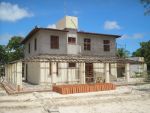 a windmill, and we have the option to keep animals if we want. Plus, there is a wonderful spot where my wife and I are going to build a new house. If everything goes right, we'll be able to move into our house in mid-August. Our son completely renovated his own home. In the meantime we've been busy cultivating some fruit trees; we already have enough fruit for ourselves, and so we've even begun to sell some of the fruit. Our property measures out to 16 acres. It's there that we're going to offer people the opportunity to take part in our community.
a windmill, and we have the option to keep animals if we want. Plus, there is a wonderful spot where my wife and I are going to build a new house. If everything goes right, we'll be able to move into our house in mid-August. Our son completely renovated his own home. In the meantime we've been busy cultivating some fruit trees; we already have enough fruit for ourselves, and so we've even begun to sell some of the fruit. Our property measures out to 16 acres. It's there that we're going to offer people the opportunity to take part in our community.
The strangest thing about this experience, which I hadn't expected at all, is that I've begun to live out a second youth. Conditions outside the major cities in Brazil are comparable to the way they were in The Netherlands fifty years ago. Who has ever had the chance to live out a second youth?'
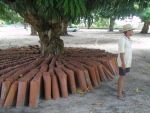 Van Dongen's son is thirty years-old and has not been able to find work in Brazil. For now he works three months out of the year in The Netherlands and is able to live off that during the other nine months in Brazil, in the house that he purchased with savings. His house is equipped with a wireless connection to Fortaleza, through which he gets high-speed internet for the same price as he would in The Netherlands. Van Dongen's property is adjacent to a small community of around 200 people who are widely dispersed throughout an area measuring just under 2000 acres.
Van Dongen's son is thirty years-old and has not been able to find work in Brazil. For now he works three months out of the year in The Netherlands and is able to live off that during the other nine months in Brazil, in the house that he purchased with savings. His house is equipped with a wireless connection to Fortaleza, through which he gets high-speed internet for the same price as he would in The Netherlands. Van Dongen's property is adjacent to a small community of around 200 people who are widely dispersed throughout an area measuring just under 2000 acres.
Piet van Dongen: 'We get by quite nicely here. If we want to go to the big city, then we go to the big city. But life in the community that we're living in now is nice because we only need the big city for going to the bank and for buying things that we can't get locally. Of course my wife goes to the hair salon, I go to the bank, and then we go out for a good meal - all of which we really enjoy. And then we can set out back towards home.' Van Dongen speaks highly of dental and hospital care in Fortaleza.
'In the meantime we've purchased a couple of goats, and we'll be buying some chickens soon. You can buy anything in the surrounding neighborhood. But if that turns out not to be the case, then you could consider getting ahold of more animals for your food supply. We're going to plant vegetables and potatoes, so yes - 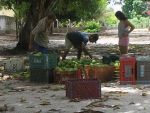 at that point you're providing quite a lot for yourself. If there's wind - and there's a lot of it - the windmills pump the water, which goes into barrels and becomes our water supply. We've got a lot of fruit trees, trees with mangos, cashew nuts, limes, with a lot of different fruits. We usually make suco from these, juice, which gets squeezed just like orange juice. Aside from that, we've been selling a portion of the fruit harvest. Right now we're paying for electricity, and we buy bottled gas.'
at that point you're providing quite a lot for yourself. If there's wind - and there's a lot of it - the windmills pump the water, which goes into barrels and becomes our water supply. We've got a lot of fruit trees, trees with mangos, cashew nuts, limes, with a lot of different fruits. We usually make suco from these, juice, which gets squeezed just like orange juice. Aside from that, we've been selling a portion of the fruit harvest. Right now we're paying for electricity, and we buy bottled gas.'
But what he really wants to do is reap energy from the Brazilian sunshine: 'Because there's a lot of it - hours and hours of sunshine. But the problem that you run into is that the price of solar panels is exorbitant. And that's makes sense, because Brazil has big oil companies and they aren't going to allow people to make use of solar energy in the short term. We've purchased a number of solar-powered lanterns here in The Netherlands that we'll be taking back with us to Brazil. Perhaps we'll start importing that type of lantern at some point.'
Van Dongen would be glad to see a few like-minded people come and live on the land, maybe about six groups of people, such as families for instance: 'Some Dutch people have come to visit us. But not only Dutch, we've had an American come by, a few French people. And they've expressed interest in establishing themselves there. We've said that we want to have our plan for the sitio [the house and the property combined] all buttoned up before we start on other projects. We're thinking about having four, maybe five houses on our property.'
Daan de Wit: There's internet there, so as I understand it, I'd be able to maintain my website myself.
Piet van Dongen: 'That's no problem at all. We do all our banking over the internet. We have an account in The Netherlands and an account in Brazil - that way we don't find ourselves in a predicament at some point. We can get money out of the ATM in Fortaleza. I still do some trading in stocks, and that works perfectly over the internet. Aside from that, the link to family in The Netherlands is nice and short; you can read the Dutch newspapers online and get the latest news right away. So what is there to miss?'
Daan de Wit: The link is very short, but it's not physical.
Piet van Dongen: 'No, but that's no problem because we've also set up a webcam so that you can see what's happening on the other end. So if you make a funny face, you can see that. And if you're worried about something, then you can see that too. So we think it's ideal.'
Daan de Wit: What do you have to physically take with you to be able to live there?
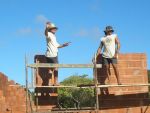 Piet van Dongen: 'Brazil places certain requirements on those who want to come and live there, for instance they require that you have a gross income of at least two thousand dollars U.S. per month. But that's not set in stone, and with a lawyer you can get around that to an extent. All of these experiences have gone straight into our 'backpack', and we can help others with this. We've gone through the entire process, and we believe that it would be prudent for people to come and stay in Brazil for between three to six months. If you wanted to stay longer, then that wouldn't be a problem either, but the only obstacle there is that you would have to pay a small fee each day that you stay to the policia federal.
Piet van Dongen: 'Brazil places certain requirements on those who want to come and live there, for instance they require that you have a gross income of at least two thousand dollars U.S. per month. But that's not set in stone, and with a lawyer you can get around that to an extent. All of these experiences have gone straight into our 'backpack', and we can help others with this. We've gone through the entire process, and we believe that it would be prudent for people to come and stay in Brazil for between three to six months. If you wanted to stay longer, then that wouldn't be a problem either, but the only obstacle there is that you would have to pay a small fee each day that you stay to the policia federal.
So you buy an empty parcel of land. If you can buy about 2.5 acres and want to build a house with a swimming pool on it, then you'll need to be prepared to pay - if the land can be easily reached, because that's definitely a precondition - between 125,000 and 150,000 euros. But then you'll have something that is exactly to your liking.'
Daan de Wit: Sounds good. But that includes the labor and all the building materials, so an empty parcel of land plus 125,000 euros, and you can live there? And after that, all you've got is depreciation - obviously there's no need to pay rent.
Piet van Dongen: 'That's right. And then if you like you can choose to hire someone who'll take care of the chores at the sitio and keep an eye on things. That costs somewhere between 100 and 150 euros per month. Water is not piped in; everybody's got a well, so the water is free. In general the cost of electricity isn't too bad at all. And it's the same with your gas usage, because you don't need any heating at all, so that makes a huge difference. You spend ninety percent of the day outside.'
Daan de Wit: What are the disadvantages?
Piet van Dongen: 'So far we've discovered hardly any disadvantages. The biggest drawback is the shape of the roadways - you can't imagine... We got through the dry season, and that was tough. In the meantime we've been through a really good 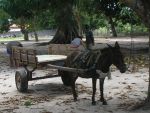 rainy season, and that's ten times worse. But yeah, you've got time - 'I can't go today, so I'll go tomorrow instead. If I end up spending two hours doing something that I would normally do in one hour, then that's not a problem at all'.'
rainy season, and that's ten times worse. But yeah, you've got time - 'I can't go today, so I'll go tomorrow instead. If I end up spending two hours doing something that I would normally do in one hour, then that's not a problem at all'.'
Daan de Wit: And what if you have to go on foot? Because Middelkoop was also talking about Peak Oil and the likelihood that oil will soon be unaffordable.
Piet van Dongen: 'A lot of people walk or ride their bike - all kinds of things are easily transported by bicycle - gas, chickens, children. People there still walk with a basket of vegetables on top of their head. In the area where we are there are very few cars. Public transportation is perfect; there are only a few bus stops, but if you stick out your hand and the bus isn't too full, the driver stops and picks you up for a few cents. Life, as we experience it there, is perfect.'
Daan de Wit: Is it perfect for someone without a pension as well?
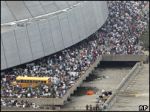 Van Dongen: 'You need to see to it that you - definitely if you're somewhat younger - that you have things to do. And so that's why it's important that people go there and get their bearings, and then say, 'We'd like to make this step, but perhaps later in life. We'll travel to Brazil for x-number of weeks per year in order to experience what it's like there.' And while you're there you could rent your house back home. Don't just up and say, 'We're going.' It's very wise to build up to it gradually. We did it that way too - in phases.
Van Dongen: 'You need to see to it that you - definitely if you're somewhat younger - that you have things to do. And so that's why it's important that people go there and get their bearings, and then say, 'We'd like to make this step, but perhaps later in life. We'll travel to Brazil for x-number of weeks per year in order to experience what it's like there.' And while you're there you could rent your house back home. Don't just up and say, 'We're going.' It's very wise to build up to it gradually. We did it that way too - in phases.
We made the choice deliberately - we deliberately did everything one step at a time. So we hope that all this misery Middelkoop talks about never comes to pass, but we see the chances as being quite real that things will play out in such a way that isn't very nice. It's not unthinkable. If you look at what happened in New Orleans, then you can see that it can actually happen. In a short period of time, a kind of chaos can develop that's unmanageable for everybody.'
Daan de Wit: And then you'll be sitting pretty in Brazil.
Piet van Dongen: 'Sure, but I won't be happy to see others suffer.'
Daan de Wit: Piet, in doing your research, have you looked into the potential for natural catastrophes? You're living seven kilometers from the sea... Could it be prone to earthquakes there... What have you found out about that?
Piet van Dongen: 'Yes, we've certainly familiarized ourselves with that. You can see that the sea is rising. You see this especially with the houses and the huts that are built quite close to the shoreline - you can see them disappearing halfway into the sea. The water is rising, but when it will get to us and how high it will be, nobody knows. So we've had our house built sixty centimeters higher up. If the water comes, then we're prepared. And by doing things this way, you always see more things that you need to pay attention to. Once you find one thing, then you run right into something else. Obviously you can never completely protect yourself - an airplane could crash into your house tomorrow. But at least you've done everything that you can. Something that does appeal to me a little bit is that it's a very stable country, geographically and militarily speaking. Earthquakes don't occur there, if I have it correctly. Two years ago a typhoon came through the neighborhood for the first time. Last year there was a tsunami of sorts that hit Fortaleza, but I'm told that this happens very seldom. You obviously can't undertake something without running a risk.
If we can get everything up to speed, then we can be self-sufficient for a minimum of one year. It's difficult to say how extensive the problems are that Middelkoop talks about. But I think that a year of working our way through this will most likely be amply sufficient.'
Daan de Wit: You seem really vital now, but twenty years from now that might be different, and then you'll still be in Brazil. How will that work out?
Piet van Dongen: 'If we had stayed in The Netherlands and ended up becoming invalids unable to care for ourselves, then that would have been depressing for us. My wife has always worked as a personal care assistant 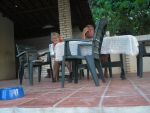 and I hear stories about people in The Netherlands who are given a shower once a week, who get a diaper in the morning and then as long as somebody doesn't forget about it, have it removed in the evening - an undignified dignified life.
and I hear stories about people in The Netherlands who are given a shower once a week, who get a diaper in the morning and then as long as somebody doesn't forget about it, have it removed in the evening - an undignified dignified life.
We've adapted our house in Brazil appropriately: there are no thresholds, the doors are 80 centimeters in width to accommodate the prospect of a wheelchair, and there's a guest bedroom which will double as a spare bedroom for a nurse. You can have a nurse at your disposal for around 300 euros per month. So now I can say, 'That's a dignified way to go.'
Our son helped us think about where we should place various appliances in the house. For example he set things up so that we have a terrace next to our bedroom. The washing machine will go on that terrace. In the bedroom we have the space to store our clothing and to set up the ironing board. So that way we keep the distance between things as short as possible. Those are the types of things that our son came up with, things that we wouldn't have thought about at all.
Any and all feedback is welcome. We always like to hear what people have to say. No problem. We've accumulated a wealth of experience and we'd be glad to share that with others.
Oh - and uh, Daan: See you in Brazil!'

 mail this article
|
mail this article
|
 print
|
print
| 

 a windmill that can pump the water if there is enough wind. We have electricity, so we're only dependent on a few variables. The climate is exceptionally nice - it stays between 80 and 92 degrees F throughout the entire year. We get a rainy season that lasts approximately three months, during which time we collect water, which we need for the duration of the year.'
a windmill that can pump the water if there is enough wind. We have electricity, so we're only dependent on a few variables. The climate is exceptionally nice - it stays between 80 and 92 degrees F throughout the entire year. We get a rainy season that lasts approximately three months, during which time we collect water, which we need for the duration of the year.' Van Dongen: 'You need to see to it that you - definitely if you're somewhat younger - that you have things to do. And so that's why it's important that people go there and get their bearings, and then say, 'We'd like to make this step, but perhaps later in life. We'll travel to Brazil for x-number of weeks per year in order to experience what it's like there.' And while you're there you could rent your house back home. Don't just up and say, 'We're going.' It's very wise to build up to it gradually. We did it that way too - in phases.
Van Dongen: 'You need to see to it that you - definitely if you're somewhat younger - that you have things to do. And so that's why it's important that people go there and get their bearings, and then say, 'We'd like to make this step, but perhaps later in life. We'll travel to Brazil for x-number of weeks per year in order to experience what it's like there.' And while you're there you could rent your house back home. Don't just up and say, 'We're going.' It's very wise to build up to it gradually. We did it that way too - in phases. 






